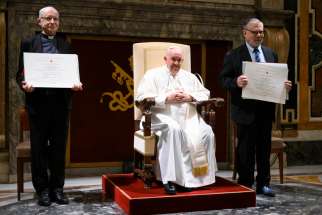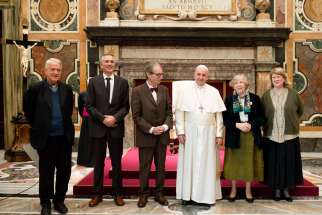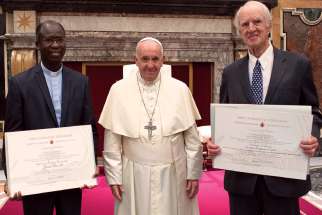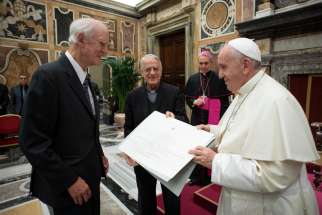Presenting the Ratzinger Prize to a French Jesuit theologian and a Jewish law professor, Pope Francis paid tribute to his predecessor and his theological work.
Pope Francis urges Ratzinger Prize winners to hold fast to truth like Pope Benedict
VATICAN CITY (CNS) -- Honoring an Australian theologian, a French philosopher and two German theologians, Pope Francis prayed that they may continually be inspired by retired Pope Benedict XVI's episcopal motto, "Cooperatores veritatis" -- co-workers in the truth.
During a midday meeting in the Clementine Hall of the Apostolic Palace Nov. 13, Pope Francis awarded the Ratzinger Prize to Tracey Rowland, an Australian theologian; French philosopher Jean-Luc Marion; and German theologians Hanna-Barbara Gerl-Falkovitz and Ludger Schwienhorst-Schönberger.
After the ceremony, the four awardees visited Pope Benedict at his home in the Mater Ecclesia monastery in the Vatican Gardens.
Rowland and Marion won the prize in 2020, but the ceremony was not held because of the COVID-19 pandemic.
The Ratzinger Prize recognizes theologians, specialists in sacred Scripture or artists, scientists or philosophers who have enriched theological studies by their work.
The pope chooses the winners from a short list of candidates recommended by a five-person committee of the Joseph Ratzinger-Benedict XVI Foundation, which was established in 2010 to support theological research and to promote studies on the theology and teaching of the retired pope.
Jesuit Father Federico Lombardi, president of the foundation, said the award is not a recognition of a particular book or project, but considers "the long and in-depth work" of the winners.
Cardinal Gianfranco Ravasi, president of the Pontifical Council for Culture, introduced Rowland's work, noting how, from the time of her doctoral dissertation, "the presence of the thought of Joseph Ratzinger, alongside other masters such as (Jesuit Father Henri) de Lubac and (Alasdair) MacIntyre, has been significant."
"Her research has developed in fundamental theology and theological anthropology along an itinerary of dialogue with culture, often presenting to the contemporary world the Christianity of the Incarnation with originality," the cardinal said. "Emblematic in this perspective are both her 'Guide for the Perplexed,' whose title refers not only to Benedict XVI but also to the medieval Jewish experience of dialogue proposed by Moses Maimonides, and 'Ratzinger's Faith,'" a book on the theology of Pope Benedict.
"Tracey Rowland's research has constructed a significant portrait of Ratzinger the theologian but also offered a significant look at the challenges facing the church in post-conciliar theology and contemporary culture," Cardinal Ravasi said.
Bestowing the awards, Pope Francis paid tribute to the gifts God has given the scholars and to the way the scholars have developed those gifts.
"The dynamic of the human mind and spirit in knowing and creating is truly boundless," he said. "This is the effect of the 'spark' ignited by God in the person made in his image, capable of seeking and finding ever new meanings in creation and history, and of continuing to express the vitality of the spirit in shaping and transfiguring matter."
"But the fruits of research and art do not ripen by chance and without effort. Recognition, therefore, goes at the same time to the prolonged and patient effort that they require to reach maturity," he said. The scholars' dedication "is an invaluable service for the elevation of the spirit and dignity of the person, for the quality of relationships in the human community and for the fruitfulness of the mission of the church."
Pope Francis noted how the winners had drawn on and built on the work of people who had gone before them, educating "us to think in order to live our relationship with God and with others ever more profoundly (and) to direct human action with virtues and above all with love."
"Among these teachers there is a theologian who was able to open and nourish his reflection and his cultural dialogue toward all these directions together, because faith and the church live in our time and are friends of every search for truth. I speak of Joseph Ratzinger," he said.
When Professor Joseph Ratzinger was named archbishop of Munich, Pope Francis said, he chose his episcopal motto, "Cooperatores veritatis," from the Third Letter of John.
The words "express the common thread of the different stages of his life, from his studies to his academic teaching, to his episcopal ministry, to his service for the doctrine of the faith -- to which he was called by St. John Paul II 40 years ago -- up to his pontificate, characterized by a luminous magisterium and an unfailing love for the truth," Pope Francis said.
"'Cooperatores veritatis' is therefore also the motto that stands out on the diploma given to the awardees, so that it may continue to inspire their commitment," he said.
Canadian philosopher Charles Taylor wants spirituality in public sphere
VATICAN CITY -- The heady realm of philosophy got special accolades in November when the preeminent Canadian philosopher, Charles Taylor, won the Ratzinger Prize.
Canadian philosopher Charles Taylor receives Ratzinger Prize
VATICAN CITY -- Giving the Ratzinger prize to a philosopher from Canada and a Scripture scholar from Burkina Faso, Pope Francis said they demonstrate that "in the variety of cultures, diverse across time and space, one can and should always seek the way to God and the encounter with Christ."





